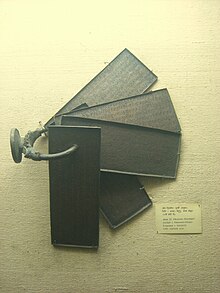The Telugu–Kannada script (or Kannada–Telugu script) was a writing system used in Southern India. Despite some significant differences, the scripts used for the Telugu and Kannada languages remain quite similar and highly mutually intelligible. Satavahanas and Chalukyas influenced the similarities between Telugu and Kannada scripts.[6]
| Telugu-Kannada script Kannada-Telugu script | |
|---|---|
 Copper plate inscriptions in Kannada–Telugu script | |
| Script type | |
Time period | 7th century –14th century[1][2] |
| Direction | Left-to-right |
| Languages | Kannada Telugu Tulu Konkani Sanskrit |
| Related scripts | |
Parent systems | |
Child systems | Kannada script, Telugu script |
Sister systems | Pyu |
History
The Dravidian family comprises about 73 languages including Telugu, Tamil, Kannada, and Malayalam. Satavahanas introduced the Brahmi to present-day Telugu and Kannada-speaking regions.
During the 5th to 7th centuries the early Bādāmi Chālukyās and early Banavasi Kadambās used an early form of the Kadamba script in inscriptions.[7] When Chalukya empire extended towards Telugu speaking regions they established another branch in Vengi, namely the Eastern Chalukyas or the Chalukyas of Vengi who later introduced Kadamba script to Telugu language which developed into the Telugu-Kannada script which was used between the 7th and 11th centuries CE.[1]
Between 1100 CE and 1400 CE, the Telugu and Kannada scripts separated from the Telugu-Kannada script. Both the Telugu and Kannada scripts were standardised at the beginning of the nineteenth century.[8]
Comparison
The following sections visualize the difference between modern-day Telugu and Kannada styles.
Consonants
| Telugu/Kannada (ISO) | IPA | Telugu/Kannada (ISO) | IPA | Telugu/Kannada (ISO) | IPA | Telugu/Kannada (ISO) | IPA | Telugu/Kannada (ISO) | IPA |
|---|---|---|---|---|---|---|---|---|---|
| క/ಕ (ka) | /ka/ | ఖ/ಖ (kha) | /kʰa/ | గ/ಗ (ga) | /ɡa/ | ఘ/ಘ (gha) | /ɡʱa/ | ఙ/ಙ (ṅa) | /ŋa/ |
| చ/ಚ (ca) | /tʃa/ | ఛ/ಛ (cha) | /tʃʰa/ | జ/ಜ (ja) | /dʒa/ | ఝ/ಝ (jha) | /dʒʱa/ | ఞ/ಞ (ña) | /ɲa/ |
| ట/ಟ (ṭa) | /ʈa/ | ఠ/ಠ (ṭha) | /ʈʰa/ | డ/ಡ (ḍa) | /ɖa/ | ఢ/ಢ (ḍha) | /ɖʱa/ | ణ/ಣ (ṇa) | /ɳa/ |
| త/ತ (ta) | /t̪a/ | థ/ಥ (tha) | /t̪ʰa/ | ద/ದ (da) | /d̪a/ | ధ/ಧ (dha) | /d̪ʱa/ | న/ನ (na) | /n̪a/ |
| ప/ಪ (pa) | /pa/ | ఫ/ಫ (pha) | /pʰa/ | బ/ಬ (ba) | /ba/ | భ/ಭ (bha) | /bʱa/ | మ/ಮ (ma) | /ma/ |
| య/ಯ (ya) | /ja/ | ర/ರ (ra) | /ɾa/ | ల/ಲ (la) | /la/ | వ/ವ (va) | /ʋa/ | ళ/ಳ (ḷa) | /ɭa/ |
| శ/ಶ (sa/śa) | /ʃa/ | ష/ಷ (ṣa) | /ʂa/ | స/ಸ (sa) | /sa/ | హ/ಹ (ha) | /ha/ | ఱ/ಱ (ṟa) | /ra/ |
There is another legacy consonant ೞ/ఴ (ḻa) used to represent /ɻa/, but currently not in use.
Vowels
Independent vowels
| Telugu/Kannada (ISO) | IPA | Telugu/Kannada (ISO) | IPA |
|---|---|---|---|
| అ/ಅ (a) | /a/ | ఆ/ಆ (ā) | /aː/ |
| ఇ/ಇ (i) | /i/ | ఈ/ಈ (ī) | /iː/ |
| ఉ/ಉ (u) | /u/ | ఊ/ಊ (ū) | /uː/ |
| ఋ/ಋ (r̥) | /ɾu/ | ౠ/ೠ (r̥̄) | /ɾuː/ |
| ఌ/ಌ (l̥) | /lu/ | ౡ/ೡ (l̥̄) | /lu:/ |
| ఎ/ಎ (e) | /e/ | ఏ/ಏ (ē) | /eː/ |
| ఒ/ಒ (o) | /o/ | ఓ/ಓ (ō) | /oː/ |
| ఐ/ಐ (ai) | /aj/ | ఔ/ಔ (au) | /aw/ |
Numerals
| Digit | 0 | 1 | 2 | 3 | 4 | 5 | 6 | 7 | 8 | 9 |
|---|---|---|---|---|---|---|---|---|---|---|
| Telugu | ౦ | ౧ | ౨ | ౩ | ౪ | ౫ | ౬ | ౭ | ౮ | ౯ |
| Kannada | ೦ | ೧ | ೨ | ೩ | ೪ | ೫ | ೬ | ೭ | ೮ | ೯ |
Unicode
Although the alphabets for Telugu and Kannada languages could have been encoded under a single Unicode block with language-specific fonts to differentiate the styles, they were encoded separately by the governments due to socio-political reasons. Both the script variants were added to the Unicode Standard in October 1991 with the release of version 1.0.
See also
References
Citations
- ^ a b Diringer, David (1948). Alphabet a key to the history of mankind. p. 381.
- ^ Salomon 1998, p. 41.
- ^ The Blackwell Encyclopedia of Writing Systems by Florian Coulmas, p. 228
- ^ Handbook of Literacy in Akshara Orthography, R. Malatesha Joshi, Catherine McBride (2019), p. 29
- ^ Salomon 1998, pp. 35, 40.
- ^ "Evolution of Telugu Character Graphs". Archived from the original on 2009-09-23. Retrieved 2013-07-22.
- ^ "Epigraphical Studies in India - Sanskrit and Dravidian, Scripts used in India, Scripts Abroad". Retrieved 2013-09-06.
- ^ Austin, Peter (2008). One Thousand Languages: Living, Endangered, and Lost. University of California Press. p. 117. ISBN 978-0-520-25560-9.
Bibliography